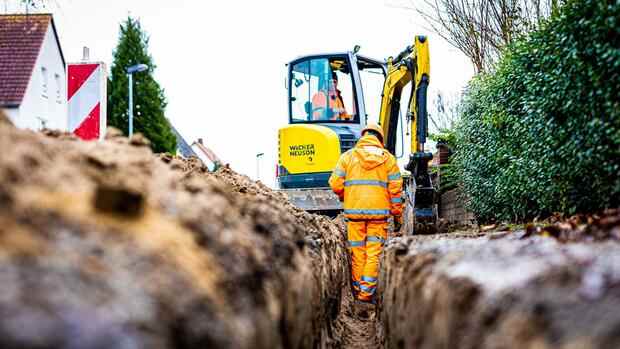Berlin What is fast internet and how can every household in the country get it, no matter how remote it is? A dispute has broken out between the traffic light coalition and the federal states over this question.
Accordingly, people without a direct connection to the Internet would have to be satisfied with connections of ten megabits (Mbit) per second when downloading data and 1.7 Mbit per second when uploading.
The delay, the so-called latency, should be allowed to be up to 300 milliseconds. 25 to 50 milliseconds are normal for normal Internet connections. The Federal Council should now agree on June 10th. But the countries are stepping on the brakes.
Top jobs of the day
Find the best jobs now and
be notified by email.
Lower Saxony’s Economics Minister Bernd Althusmann (CDU) told the Handelsblatt: “The connection speeds provided by the federal government for the basic service of ten Mbit in the download are not sufficient, and the planned latency of up to 300 milliseconds is exceptionally slow.” Simultaneous video conferences of more than one person in a household would not be possible with the basic supply, said Althusmann. “In times of working from home and distance learning, that’s not realistic.”
Lower Saxony and Bavaria require changes
Lower Saxony, together with Bavaria, will submit a corresponding application to the Bundesrat and demand changes. At the urging of the federal states, the specialist committee of the federal state chambers has already positioned itself. They demand that exceptions to the rule be removed, so that high-speed internet, for example, must be guaranteed “always” and not “regularly”.
Download rates should also be 30 Mbit, and the upload rate should be doubled to 3.4 Mbit. 15 countries voted in favor of it in the Committee on Agricultural Policy and Consumer Protection, Schleswig-Holstein abstained.
Falko Mohrs, digital politician of the SPD parliamentary group, said: “If the federal states untie the package, then we will bring our questions.” The digital committee had many open questions, which should be answered in a year given the short time, if the regulation must be extended. “We didn’t want a quick shot from the hip with any values.”
>> Read here: Internet for everyone – How fast does it have to be at least?
Mohrs doubted that the ordinance could be passed before the summer break at the beginning of July if there was a new discussion. The schedule is “sporty,” he said.
Business associations are in a state of alarm
From the point of view of the associations of network operators, the regulation proposed by the Federal Network Agency and supported by the Federal Ministry of Transport around Transport Minister Volker Wissing (FDP) is sufficient. In view of the development there is now an alarm mood there. They want to use scarce capacities in the construction sector for broadband expansion in worthwhile areas and not in peripheral locations. The companies are relying on the fact that primarily satellite Internet is used and that the expansion of the broadband network is not necessary.
From the point of view of the associations of network operators, the regulation is sufficient.
(Photo: IMAGO/Chris Emil Janssen)
But there are doubts as to whether the technology will be sufficient, and concerns that it may be too costly. “It is completely unclear whether multi-person households are properly supplied,” criticized the digital politician of the Union faction, Reinhard Brandl. “Instead, the coalition plans to continue to comfort citizens in peripheral locations with satellite Internet connections.”
At a hearing in the Digital Committee, many experts also expressed doubts. The Federal Network Agency itself spoke of starting a “dynamic development”. According to the law, the values must be checked every year.
Before the vote in the Digital Committee of the Bundestag, the Union faction called for the minimum bandwidth to be doubled to 20 Mbit per second and the speed for uploading content to 3.4 Mbit. There should be no exceptions.
The Digital Committee, on the other hand, agreed with the votes of the SPD, Greens and FDP to approve the regulation and to conduct a study to check whether the specifications are sufficient to ensure that all households can participate. Finally, the right to fast internet should be introduced quickly.
The aim of the federal states remains nationwide broadband expansion by 2025
One of the open questions that the Ministry of Transport has not answered is how fast the Internet has to be for a one-person to five-person household to be able to use it stably.
It is also unclear whether satellite technology can guarantee this at realistic prices. Accordingly, the coalition partners also demanded from the FDP-led ministry “the development of a valid database on the bandwidths available in Germany in relation to individual households”.
The goal of the federal states remains the nationwide broadband expansion by 2025, according to the Lower Saxony Ministry of Economic Affairs. The federal government’s reluctance to provide funding and the postponement of its expansion target to 2030 make adequate basic services even more important.
With their minimum values, the federal government and industry wanted to make it possible for a fixed network connection to be completely omitted and instead referred to supply by satellite. However, this connection can mean costs of more than 100 euros per month for a moderately powerful Internet connection.
More: Broadband expansion – countries rebel against Digital Minister Wissing
